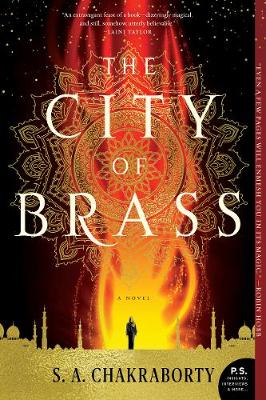
Discover this spellbinding debut from S.A. Chakraborty.
'An extravagant feast of a book - spicy and bloody, dizzyingly magical, and still, somehow, utterly believable' Laini Taylor, Sunday Times and New York Times bestselling author
Among the bustling markets of eighteenth century Cairo, the city's outcasts eke out a living swindling rich Ottoman nobles and foreign invaders alike.
But alongside this new world the old stories linger. Tales of djinn and spirits. Of cities hidden among the swirling sands of the desert, full of enchantment, desire and riches. Where magic pours down every street, hanging in the air like dust.
Many wish their lives could be filled with such wonder, but not Nahri. She knows the trades she uses to get by are just tricks and sleights of hand: there's nothing magical about them. She only wishes to one day leave Cairo, but as the saying goes...
Be careful what you wish for.
- ISBN10 0062678116
- ISBN13 9780062678119
- Publish Date 3 July 2018 (first published 14 November 2017)
- Publish Status Active
- Publish Country US
- Publisher HarperCollins Publishers
- Imprint Collins
- Format Paperback (US Trade)
- Pages 576
- Language English
Reviews


nannah
The City of Brass takes a new spin on the “girl discovers she has magic and is swept away to a mystical kingdom” by transplanting the story first to Cairo and then to a kingdom made up of the djinn of Islamic mythology and the daeva of Zoroastrian mythology.
Content warnings:
- human and sex trafficking
- rape mention
- slavery
- the unfortunate over-a-thousand-yr-old guy falls in love with a young adult trope
- ableist slur (cr slur, used multiple times)
Representation:
- Nahri, a PoV character, is Muslim and Egyptian
- Ali, the other PoV character, is Muslim, Egyptian, and Arab
- Dara, a love interest, is Persian and Zoroastrian
- the other characters are either Muslim or Zoroastrian, and are any ethnicity from Northern and Eastern Africa to Western China.
- two secondary characters are gay/bi
Though orphan Nahri can speak any language and heal people--sense and treat their illnesses by smelling them, touching them, looking at them--she doesn’t believe in magic. She makes a living in 18th century Cairo by conning the Franks and Turks and occasionally by performing fake exorcisms. But when Nahri sings in her native tongue instead of Arabic during one such ceremony, she accidentally summons two entities: an Ifrit and an ancient daeva named Dara. Dara saves Nahri from the Ifrit, tells her daeva blood runs through her veins, and takes her to the legendary djinn-and-daeva-populated city of Daevabad.
Daevabad is a far cry from a utopia, though, as Prince Ali knows well. The second son of the reigning king, he has seen how old grudges, blood purity, intolerance, and politics between the six djinn tribes has led to a city ready to boil over. When he gets caught in between the shafits' fight for rights (the mixed-race, human-djinn citizens of Daevabad) and his father's demands to crack down on shafit riots, even his older brother might not be able to protect him.
Before anything else, I have to say the setting is gorgeously realized. It’s easy to be transported, to feel the heat of the desert, the smoky presence of the djinn themselves, and to feel a part of the city along with each tribe (or not ... depending on the tribe). I’ve been wanting a book that I could get lost into, a thick fantasy with rich setting and complex politics--this one ticks those boxes perfectly.
I also want to express how frustrated I am with the publisher and whoever marketed this book that no one thought to mention that the story draws on Zoroastrian mythology as well as Islamic mythology. There’s a mention of pre-Islamic mythology, but that doesn’t do much if no one looks anything up. Zoroastrianism is so little known as it is, both of these peoples deserve representation! Obviously this isn’t the fault of the author, but I just had to shake my fist for a second.
I have to commend Chakraborty on creating characters with as many faults as strengths--and faults that are not “cute” or secretly strengths in disguise. While I don’t like every character (even those I think I’m supposed to … like Dara), it’s still wonderful to have interesting people to read about.
My favorite character is someone who I thought would remain a minor presence throughout the story, and who I was marvelously wrong about --he turns out to be the elder prince’s lover … and also, like Nahri, the only other daeva/djinn with healing powers. By far the best twist in the book, and it’s what actually makes me want to read the second. But Ali comes close, the second PoV character. He’s the only one who really has an arc, too, which is a shame, but his arc is great. I love that I didn’t love him in the beginning, and that I did in the end.
But there is also a lot that I disliked about The City of Brass.
Mainly Dara. Not only is he some 1400-year-old guy who falls in love with the young main character (is she maybe 18-20?), he’s one of the most obnoxious, unlikable, violently possessive, and abusive characters I’ve ever read, especially for a love interest. At one point he downright gaslights Nahri. If we’re supposed to like Dara, I can’t understand why. I know he’s got a lot of trauma, and he displays symptoms of PTSD at certain points in the story, but that doesn’t excuse most of his behavior.
The book also feels like it needs another big edit. The first half of the book is so different from the second half: cliched YA romance vs NA political fantasy. And the romance isn’t even very convincing, either; I’m still not sure what Nahri and Dara like about each other … what about Nahri draws her to Dara and vice versa. At one moment they’re annoyed with each other and then they’re blushing and stammering. It’s just “he’s hot, tho …”, another thing that really makes the story feel YA, rather than adult. I’m almost convinced the book was written as a YA manuscript initially, and then was edited to become adult after it was picked up by an agent. Whatever the reason, I just really wanted something different … so my being disappointed with it wasn’t completely its fault.
Contrary to a lot of the other reviews, I disliked Nahri’s PoV during the first half, where events just seem to happen to Nahri and Dara, without any reason or motive, and the only plot-related thing happening is Nahri making Dara blush like a schoolboy. Ali’s PoV is much more interesting, and his chapters mark the tone for the second half as well, which is great. I almost quit reading during the first half, and I’m glad I stuck it out!
But a lot of what was introduced in Ali’s PoV during the first half gets pushed to the sidelines in the second, such as the shafits’ fight for rights, and Ali's precarious position, who believes all beings are equal under the Creator. And Ali's father, the King, who has to juggle the multiple tribes' squabbling, the grassroots shafit groups, the Daeva tribe who believe shafit to be an abomination, and the other tribes who believe the Daeva’s religion is nothing more than a cult who don’t deserve the royal protection, etc. Instead, what’s drawn to the forefront is a love triangle between Ali, Dara, and Nahri.
And while I understand wanting two PoVs for this story--especially one representing a daeva (Nahri) and one representing a djinn (Ali), and especially one representing the old rulers of Daevabad (Nahri[’s ancestors]) and the current ones (Ali[’s family]), I often felt like the switches happen during places that cut the high tension back to zero. When we return to that person’s story, it's hard to reclaim the same amount of tension, emotion, etc. Both Nahri and Ali’s voices also read the same, as well. They have such different backgrounds and personalities, there's such potential for different styles that was (perhaps?) overlooked.
Don’t get me wrong, though, there are beautiful scenes, wonderful tension between Nahri and her own Daeva tribe who put her on a pedestal and expect her to do things she can’t, who want her to believe things she doesn’t, and some great scenes between Ali and his older brother. But what I didn’t like I just couldn’t stand. Hopefully, now that characters and conflicts are introduced, I'll have better luck with the sequel! The ending is an incredibly ambitious move, and I'd like to see where Chakraborty takes the story from here.

Joséphine
Initial thoughts: As much as I enjoyed The City of Brass the first time that I listened to the audiobook, I didn’t quite love it enough. My reread of the hardcover in order to continue with the sequels rectified that however. This is a such an intricately woven fantasy set in an alternative historical Middle East, it starts off slow but then suddenly everything you think you know about anything and anyone unravels right in front of your face.
The reason I docked half a star though, is that I’m not the biggest fan of “travel to a distant land to discover the protagonist is not who they thought they were” tropes. I find the in between time from leaving a place to arriving at the destination a little cumbersome and often unnecessarily long drawn. In the case of The City of Brass, Chakraborty managed to find a good balance but I still. breathed a sigh of relief when they finally arrived.
In any case, The City of Brass is a wonderful book, and I’m sure I’ll return to it again in future. Well worth the purchase for my personal library.

alindstadtcorbeax
Utterly transfixed & speechless... RTC
Buddy read with my speed read OTP buddy read bby girl, Darce!
(What’s new ?

Renee
The story itself may have quite a generic story, it was so captivating and I loved seeing it in a different setting. I also think this book touches the aspects of racism and discrimination a lot better than most fantasy books that I have read. Do keep in mind that this story has a very slow start, but the end definitely makes up for it.
One tiny little complaint I would have is that the magic system doesn't make any sense yet (at least not to me), but maybe upon a reread this will be easier to understand or upon reading the second book in this series.

roundtableknight
"That a very narrow-minded way of looking at it. I prefer to think of myself as a merchant of delicate tasks.”
~
Review 4.5 stars (read May 27th, 2020)
This book. Wow.
If your looking for a rich and intricately woven Middle Eastern inspired story, this is it. When I started this book, I knew next to nothing about it. I had seen other people raving and suggesting it to read, so I thought I would check it out. I'm not disappointed. The story starts in 18th century Cairo, and what I love is that it mixes fantasy with history; the Ottoman empire, the oppression of the people down there. It weaves a tale that made it almost impossible to put down. The only thing that I had trouble with was the amount of information and backstory of the characters and their clans, but I know that as I read the next story it will get easier to understand.

Nessa Luna

chrishall78
The story revolves around Nahri, a young lady without a family in Cairo who has been forced to become a thief and con artist to survive. She has mysterious powers of self healing and can detect illnesses and cancers in the bodies of others. After accidentally summoning a djinn warrior during a zar (Egyptian ritual dance to drive away evil spirits), she's thrown into a supernatural world where she is very much in over her head.

ross91
This one just wasn’t for me.
It’s a standard YA with the perfect-yet-“different from all the other girls”-“beautiful but she doesn’t know”-main-protagonist.
The romance was gagging.
I feel cheated! I thought this would be an asult fantasy with lots of political intrigue and different setting, but it was a YA with a non required angsty romance, lots of info dumpling, overly complicated social distinctions and an interesting setting that wasn’t very much described tho.
Maybe the last part is good. I don’t know. I don’t care enough to find out.

alisoninbookland
Our two POV characters Nahri and Ali are wonderful. Nahri is a con artist who turns out to to be a healer (Nahid). Her struggle trying to find her place in this world was great to watch play out. Ali is the younger son of the king who doesn’t fully agree with some of the beliefs held by his family. He works behind the scenes to help other beings. He’s torn between blood and beliefs. Surprisingly, Dara ended up being my favorite character of the lot. He’s a brooding warrior. I really enjoyed the his struggles. Like I said, he’s a warrior so he’s done some bad things. Then there’s the other things that he doesn’t fully remember.
The magic system is wonderfully rich. Thank goodness for the glossary of terms in the back of the book. I need lots of explanations and reminders of what things are. I love political fiction so it was fascinating to see how the ‘races’ interacted with each other as well as the prejudices within the magical world. I wasn’t always able to keep track of exactly who all the groups are in relationship to each other but I managed to keep up well enough.
The pacing is the book’s biggest downfall in my opinion. It moved at a glacial speed sometimes. It took over 200 pages for Nahri and Dara to reach the city and for things to finally get moving. The end really picks up. Those last 100 pages or so were awesome.
All in all, this was refreshing change in pace of my typically fantasy books. Can’t wait to eventually move on in the series
Blog | Instagram | Twitter | Facebook | Pinterest | Youtube
